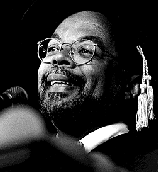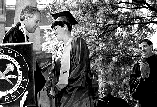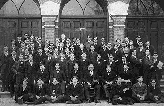
A Celebration of the Intellect
At Emory's Sesquicentennial Commencement, literary scholar Henry Louis Gates Jr. exhorts graduates to 'invent yourself'
By Allison O. Adams
- Click here to read about Marc Adler, the Goizueta Business School graduate who, at age 22, owns his own thriving business.
- Click here to read about the symbols and traditions that make Emory's Commencement unlike any other.
- Click here to read about the seven 1995 honorary degree recipients.
For the seventh consecutive year, an early morning sun warmed the
Commencement-readied Quadrangle, promising a perfect day for this year's
exercises on May 8. From the same stage on which he had been inaugurated as
University president a month before, William M. Chace officiated the historic
ceremony--his first and the University's one hundred and fiftieth. "This
occasion is at once solemn and happy," President Chace said to the 2,974
graduates and some 12,000 guests. "What we know here is the fact that these
graduates shall never again be as they were. They came to Emory less strong
than now they are. They came less well informed. They came less capacious of
mind; they needed to be taught. Since they had both talent and ambition, Emory
was glad to teach them. Now our work is over, now their time has come, we loose
these minds upon the world. Our pride in so doing is mixed with the pride
abundantly apparent this day upon this great lawn."
The thousands seated on the lawn facing Pitts Theology Library heard literary
scholar Henry Louis Gates Jr., W.E.B. DuBois Professor of the Humanities and
chair of Afro-American studies at Harvard University, deliver this year's
Commencement address. He spoke of American pluralism, of tolerance and hate
speech, of cultural and personal identity.
"I see all of you today, the product of an elite education, about to take your
turn at the helm, whether corporate, commercial, or civic," Gates said. "Karl
Marx famously wrote that all world historical events appear twice: the first
time as tragedy, the second time as farce. If this is so, then the strain of
Marxism that will engage the coming generation will be that of Groucho and not
of Karl. Forging humane commonalities out of the crucible of our differences is
always an ongoing effort, rather than a task that can be finished and forgotten
like a senior essay.
 "But when I think back to my own student days in the late sixties and early
seventies, as bewitching and bewildering as they were, I'm filled with
confidence about this class, about your class, graduating some twenty years
later. And really, the challenge that I set before you this morning is not so
very onerous. I don't ask that you get everything right. I just ask that you do
a little bit better than we did."
"But when I think back to my own student days in the late sixties and early
seventies, as bewitching and bewildering as they were, I'm filled with
confidence about this class, about your class, graduating some twenty years
later. And really, the challenge that I set before you this morning is not so
very onerous. I don't ask that you get everything right. I just ask that you do
a little bit better than we did."
One graduate living up to Gates' challenge to "do a little bit better" is Dung
Minh Nguyen, who received the Marion Luther Brittain Service Award, the
University's highest student honor. Vice President and Dean for
Campus Life Frances Lucas-Tauchar described Nguyen's many volunteer activities,
including her efforts to advance the enlightenment of Vietnamese women.
"Despite the opposition expressed within her cultural community," Lucas-Tauchar
said, "she [began] Opportunity For All, her project for elevating women's
knowledge of assertiveness, planned parenting, and self esteem." In addition,
the 1995 University Scholar/Teacher Award was given to Samuel Candler Dobbs
Professor of Politics Harvey E. Klehr, and the Thomas Jefferson Award for
service to the University was presented to Frances Winship Walters Professor of
Pediatrics George W. Brumley.
The University also conferred seven honorary degrees, the first to baseball and
civil rights hero Henry Louis "Hank" Aaron, who was greeted with a standing
ovation. "Through perseverance and fortitude," President Chace read from the
degree citation, "you showed good fences make good targets." Honorary degrees
were also awarded to W. Maxwell Cowan, medical scientist and educator;
mathematician Paul Erdös; Henry Louis Gates Jr.; Holocaust survivor and
teacher Alex Gross; philanthropist and School of Public Health benefactor Grace
Crum Rollins; and journalist, author, and 1932 Emory alumnus Maxcy Reddick
Hall.
 Set to join Hall in the ranks of the 65,611 Emory alumni were 1,545
undergraduate degree recipients, 923 graduate degree recipients, 461
professional degree recipients, 45 certificate recipients, and 31 joint degree
recipients. The class also boasts two historic graduates, Paula Washington and
Isa Williams, who earned the first two Ph.D. degrees in women's studies awarded
by Emory.
Set to join Hall in the ranks of the 65,611 Emory alumni were 1,545
undergraduate degree recipients, 923 graduate degree recipients, 461
professional degree recipients, 45 certificate recipients, and 31 joint degree
recipients. The class also boasts two historic graduates, Paula Washington and
Isa Williams, who earned the first two Ph.D. degrees in women's studies awarded
by Emory.
Although Emory's one hundred and fiftieth Commencement shared some common
elements with the first--speeches, music, and prayer--the ceremony of 1840 was missing one key ingredient: graduates.  That first event was billed
simply as "public exercises of the College" to herald the fledgling
institution's accomplishments. It was not until the following year that Emory
awarded its first degrees to three young men, making the ceremony of 1841 the first official Commencement by modern definitions.
That first event was billed
simply as "public exercises of the College" to herald the fledgling
institution's accomplishments. It was not until the following year that Emory
awarded its first degrees to three young men, making the ceremony of 1841 the first official Commencement by modern definitions.
Emory's earliest commencements were perhaps as much exercises in endurance as
they were celebrations of the intellect. For three or four days, from early
morning to evening in the midsummer heat, a small crowd sat through plain but
high-spirited programs of oration by faculty and students. A writer for the
Southern Christian Advocate noted that the three men in the class of
1841 "had on the field of strenuous mental and moral exertion, fairly won the
spurs and belt of College knighthood."
Along with students from the other classes, all three graduates delivered
Commencement addresses, which the Advocate called "exceedingly
creditable performances both as to thought, style, and delivery."  Emory's
nineteenth-century student oratories ranged from the self-assured ("The Indian
Question Solved") to the satiric ("A Defense of Loafers") to the erudite
("Christ-like Elements in the Character of Socrates").Graduates wore suits and
ties, eschewing today's traditional caps and gowns until 1902, when they became
de rigueur.
Emory's
nineteenth-century student oratories ranged from the self-assured ("The Indian
Question Solved") to the satiric ("A Defense of Loafers") to the erudite
("Christ-like Elements in the Character of Socrates").Graduates wore suits and
ties, eschewing today's traditional caps and gowns until 1902, when they became
de rigueur.
The Civil War, which caused a five-year hiatus in the life of the school, is
the reason this year's sesquicentennial Commencement falls 155 years after
Emory's first such official ceremony in 1841, instead of 150 years. From 1861 to 1866
campus buildings were used as a Confederate hospital. "The rural town was twice
overwhelmed by war's rude battalions," wrote an Advocate correspondent
to the 1867 Commencement, the first after the war. "And great poverty followed.
The cheerful beauty of the place has not yet been restored." Although there
were no regular graduates that year, some of the returning soldiers who had
been called away before completing their studies received their degrees. The
reporter added, "There were many names on the rolls of these classes of those
who slumber on the battlefield, and some present bore honorable scars."
 The early 1900s brought renewed prosperity, and Commencement acquired more of
the flavor of a festival, lasting an entire week in June. Crowds of students,
parents, alumni, trustees, and church and state dignitaries attended athletic
events, concerts, banquets, receptions, parties, and yes, more speeches. When
the University moved to Atlanta in 1915, Commencement was first held off-campus
in Wesley Memorial Church, a downtown Atlanta church that has since been
demolished. By the early 1920s, the ceremony had been moved to a garden in the
ravine across Kilgo Circle from the Old Law Building, now Carlos Hall. Glenn
Memorial Church provided the setting from 1932 until the late 1940s, when it
was moved back outdoors to a glade between Glenn Memorial and the Church School
Building. In the 1950s, it was first held in the Quadrangle, where it has
remained.
The early 1900s brought renewed prosperity, and Commencement acquired more of
the flavor of a festival, lasting an entire week in June. Crowds of students,
parents, alumni, trustees, and church and state dignitaries attended athletic
events, concerts, banquets, receptions, parties, and yes, more speeches. When
the University moved to Atlanta in 1915, Commencement was first held off-campus
in Wesley Memorial Church, a downtown Atlanta church that has since been
demolished. By the early 1920s, the ceremony had been moved to a garden in the
ravine across Kilgo Circle from the Old Law Building, now Carlos Hall. Glenn
Memorial Church provided the setting from 1932 until the late 1940s, when it
was moved back outdoors to a glade between Glenn Memorial and the Church School
Building. In the 1950s, it was first held in the Quadrangle, where it has
remained.
In the 1940s, war once again dramatically shaped the event, as noted in the
program of the March 1943 Commencement:
The Service Flag on the stage honors the more than fifteen hundred Emory alumni
who are already in military service. This number represents fifteen percent of
Emory's living alumni. Most of the graduates receiving their diplomas today
will be in uniform very soon.
Graduates often received their Army or Navy commissions the same day they
accepted their diplomas. By the following year, the number of alumni in uniform
had surged to 3,500.
When Emory celebrated the fiftieth anniversary of its University charter in
1965, Commencement, by then a one-day affair, underwent another visible change.
The University acquired the mace and the president's badge of office, two
objects that evoke the medieval origins of the academic ceremony. The late
George P. Cuttino, emeritus professor of medieval history and the University's
chief marshal from 1976 to 1984, introduced elements now inseparable from
Emory's Commencement exercises, such as distinctive regalia for administrators, the tunics worn by the chief and deputy marshals, and the bearing
of the mace and the badge of office.
Click here to return to Summer 1995 contents page.
Click here to return to Emory University Home Page.
 "But when I think back to my own student days in the late sixties and early
seventies, as bewitching and bewildering as they were, I'm filled with
confidence about this class, about your class, graduating some twenty years
later. And really, the challenge that I set before you this morning is not so
very onerous. I don't ask that you get everything right. I just ask that you do
a little bit better than we did."
"But when I think back to my own student days in the late sixties and early
seventies, as bewitching and bewildering as they were, I'm filled with
confidence about this class, about your class, graduating some twenty years
later. And really, the challenge that I set before you this morning is not so
very onerous. I don't ask that you get everything right. I just ask that you do
a little bit better than we did."



